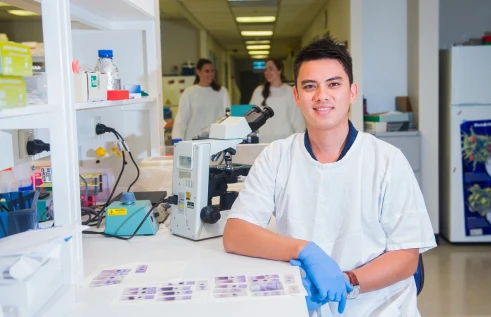Update your personalisation settings to view information about this course.
This course is only available to Domestic students and your preference is currently set to International.
This course is only available to International students and your preference is currently set to Domestic.
Key details
Duration
Locations
Entry requirements
View full entry requirementsCredit points required
40Course code
Overview
The Undergraduate Certificate Introduction to Biomedical Science is a one-year, part-time course that offers you the opportunity to upskill, reskill and retrain in biomedical science work. This course will equip you with core scientific knowledge and is a direct pathway into higher education courses in biomedical science, should you wish to continue studying. The course is designed to support your learning needs and develop your study skills.
On completing the Undergraduate Certificate Introduction to Biomedical Science, you'll be eligible to use the credits you've gained towards further study of a Bachelor of Medical Laboratory Science or a Bachelor of Biomedical Science.
You may also use the Undergraduate Certificate as a pathway for entry into a variety of other higher education courses. Credit may be granted for some or all of the subjects you successfully complete. If further study is your intention, be sure to check the requirements of your preferred undergraduate degree to determine how many credits you can transfer.
Career opportunities
The course provides you with the opportunity to upskill, retrain and reskill in medical laboratory work whilst providing pathways to pursue further study.
Fees
Commonwealth supported places
Commonwealth Supported places are available in this course to students who meet one of the following residency requirements:
(a) be an Australian citizen, who will complete some of your course of study while resident in Australia; or
(b) a New Zealand citizen; or an Australian permanent visa holder; or an eligible former permanent humanitarian visa holder; who studies the entire course while living in Australia.
Further information about fees and charges can be found at Fees and Payments.

Why study a health course at CDU?
As an increasingly in-demand industry, there's never been a better time to find a career in healthcare. Become a qualified health professional with CDU's wide range of courses and gain the skills and knowledge to make an impact on the wellbeing of your community.
- Five-star Australian university for graduate employment outcomes (GUG 2024)
- Choose to study online, on campus, part-time or full-time as it suits you
- Placements and research opportunities in the NT, across Australia, and around the world
- Uniquely positioned to explore Indigenous health, tropical medicine and other issues of regional and national importance

Why study a health course at CDU?
As an increasingly in-demand industry, there's never been a better time to find a career in healthcare. Become a qualified health professional with CDU's wide range of courses and gain the skills and knowledge to make an impact on the wellbeing of your community.
- Five-star Australian university for graduate employment outcomes (GUG 2024)
- Placements and research opportunities in the NT, across Australia, and around the world
- Uniquely positioned to explore Indigenous and Asia-Pacific health, tropical medicine and other issues of international importance

Why study a health course at CDU?
As an increasingly in-demand industry, there's never been a better time to find a career in healthcare. Become a qualified health professional with CDU's wide range of courses and gain the skills and knowledge to make an impact on the wellbeing of your community.
- Five-star Australian university for graduate employment outcomes (GUG 2024)
- Choose to study online, on campus, part-time or full-time as it suits you
- Placements and research opportunities in the NT, across Australia, and around the world
- Uniquely positioned to explore Indigenous health, tropical medicine and other issues of regional and national importance

Why study a health course at CDU?
As an increasingly in-demand industry, there's never been a better time to find a career in healthcare. Become a qualified health professional with CDU's wide range of courses and gain the skills and knowledge to make an impact on the wellbeing of your community.
- Five-star Australian university for graduate employment outcomes (GUG 2024)
- Placements and research opportunities in the NT, across Australia, and around the world
- Uniquely positioned to explore Indigenous and Asia-Pacific health, tropical medicine and other issues of international importance
What will I study?
This 40-credit point course consists of four (4) core units. This course consists of a combination of introductory and first-year degree subjects, designed to help you develop core knowledge and the necessary skills for successful university studies.
Course structure
A candidate must successfully complete units totalling 40 credit points (cp) as detailed below. All units are valued at 10 credit points unless indicated.
| Unit type | Credit Points | Specific requirements |
| Core (3 units) | 30cp | Compulsory Core units totalling 30 credit points as detailed below. SBI161* Anatomy and Physiology 1 (replaces SBI171 and SBI172 from 2025 - see additional information below) |
| General Elective (1 unit) | 10cp | General elective totalling 10 credit points. Students may choose an undergraduate unit from any available at the university, including units from the Bachelor of Biomedical Science. For those commencing their tertiary studies a suggested general elective unit is: LAL100 Language, Literacy, and Sustainability |
| 40cp | Total Credit Points |
Course changes - 2025
SBI171 Anatomy and Physiology 1 and SBI172 Anatomy and Physiology 2 have been replaced by SBI161 and SBI162 from Semester 1 2025.
- Students who have completed BOTH SBI171 and SBI172 prior to 2025 do not need to complete SBI161 or SBI162.
- Students who have NOT completed either SBI171 or SBI172 prior to 2025 should complete the two new units SBI161 and SBI162.
- Students who have completed SBI171 only (and not SBI172) should complete SBI172 in 2025. Students should NOT complete the new unit SBI162.
- Students who have completed SBI172 only (and not SBI171) should complete SBI171 in 2025. Students should NOT complete the new unit SBI161.
SBI171 and SBI172 will be offered for a final time in 2025 but will only be available to students who have completed either SBI171 or SBI172 prior to 2025.
SBI190 and SBI182 are no longer offered as part of this. Students who have completed either SBI190 OR SBI182 can use this unit as the General Elective.
Course Changes - 2024
SBI182 Microbiology added as an alternative core unit for SBI190.
Course Changes - 2022
MLS101 Heamatology 1 has been replaced by SBI172 Anatomy and Physiology 2.
SBI182 Microbiology and Immunology has been replaced by SBI190 Microbiology for Healthcare Professionals
Study plan
Students Commencing in Semester 1
The Recommended Study Plan provided below is suitable for a student commencing in semester 1 and enrolling in a part time load.
| Legend: | CO = Core Unit | GE = General Elective |
Part-time Study Plan
| Semester 1 | Semester 2 | ||
| Year 1 | |||
| SBI161 Anatomy and Physiology 1 (replaces by SBI171 from 2025) | CO | SBI162 Anatomy and Physiology 2 (replaces by SBI172 from 2025) | CO |
| SBI150 Cellular Biology | CO | General Elective | GE |
Entry requirements
Admission criteria
Admission requirements are met by one of the following:
- Successful completion of the Northern Territory Certificate of Education and Training (or equivalent).
- Successful completion of a national qualification at Certificate III level or higher.
- Successful completion of at least 0.5 year of full-time study (or equivalent) of a higher education degree/diploma.
- Overseas secondary or tertiary qualifications considered equivalent to the above Australian qualifications.
- Attainment of a STAT Multiple Choice score of 125 or higher.
- Successful completion of a recognised tertiary preparation course.
- Submission of an acceptable personal competencies statement and/or employment experience.
Essential requirements
English language requirements
DOMESTIC STUDENTS
To gain entry into Charles Darwin University, all Higher Education applicants must satisfy the University's English Language Proficiency Requirements for their chosen course of study. All applicants will be required to supply evidence of this at the time of application.
The minimum English language requirement for this course can be met by evidencing of one of the following:
| Year 12 | Successful completion of Year 12 within Australia, or an equivalent qualification from an approved country where English is the official language (refer to our approved standard and extended lists included below). |
| 0.5 FTE Higher Education Study | Successful completion of at least 0.5FTE of higher education study from Australia or an approved country where English is the official language (refer to our approved standard and extended lists included below). If studies were completed from a country on the extended list, they must have been completed within the past five (5) years. |
| CDU Enabling Course | Successful completion of a Charles Darwin University enabling program of at least 0.5FTE (40 credit points). |
| TAFE Qualification | Successful completion of a recognised TAFE qualification at a Certificate III level or higher from Australia. |
| AHPRA Registration | Current AHPRA registration as a Division 1 or Division 2 nurse. Registration must be current at the time of course commencement. |
| English Test^ | Completion of an approved English test within two years of commencement, meeting the minimum scores outlined in the table below. |
^ Minimum Requirements for English Tests:
| Postgraduate requirements | Undergraduate requirements | |
| CDU ELICOS - English for Academic Purposes | Successful completion of EAP004 | Successful completion of EAP003 |
| International English Language Testing System (IELTS) Academic test | Overall minimum: 6.5 No band below: 6.0 | Overall minimum: 6.0 No band below 6.0 |
| Cambridge English: Advanced (CAE) | Overall minimum: 176 No skill below: 169 | Overall minimum: 169 No skill below 169 |
| Pearson Tests of English (PTE) Academic | Overall minimum: 58 No score below 50 | Overall minimum: 50 No score below: 50 |
| Test of English as a Foreign language | Overall minimum: 79 Minimum writing score: 21 | Overall minimum: 60 Minimum writing score: 21 |
IELTS One Skill Retake is accepted, allowing candidates to retake a single skill within 60 days of sitting their initial test. One Skill Retake results are valid for two years from the date of the first test (not from the date of the Retake test) to the date of commencement at CDU.
CDU accepts combined results from two test sittings of IELTS Academic, PTE Academic, or TOEFL, taken within a six-month period, if:
- Both tests were under the same testing system; and
- The overall score in both tests meets the overall minimum; and
- The applicant achieved the section minimum for each section in at least one test.
Recognised English-speaking countries:
| Standard List | Antigua and Barbuda, Australia, Barbados, British Virgin Islands, Canada, Ireland, New Zealand, Singapore, South Africa, United Kingdom, United States of America. |
| Extended List | Bermuda, Botswana, Cayman Islands, Ethiopia, Fiji, Kenya, Malawi, Malta, Mauritius, Seychelles, St Vincent and the Grenadines, Tanzania, Trinidad and Tobago, Vanuatu, Zimbabwe. |
For further details on the English requirements for CDU courses, please refer to the CDU English Language Proficiency Policy.
I've had the unique opportunity to explore tropical and rural health, which I may not have had the exposure to had I studied elsewhere.
Katie
CDU student

My advice for anyone who is considering studying a health or science degree at CDU is if you are thinking about it, just do it.
Nishat
CDU student

I've had the unique opportunity to explore tropical and rural health, which I may not have had the exposure to had I studied elsewhere.
Katie
CDU student

My advice for anyone who is considering studying a health or science degree at CDU is if you are thinking about it, just do it.
Nishat
CDU student

Course details
Accreditation
This course is accredited by the University in accordance with the Higher Education Standards.
Additional information
Contact details
For further information about the course, enrolment procedures, closing dates and other administrative issues please contact Student Central on:
You make CDU
Together we are a positive force for change in our communities and the world.
You make CDU
Our students choose to study with us because we share the same vision – to make a positive change. Whatever your motivation is, we can guide you in the right direction.
You make CDU
Together we are a positive force for change in our communities and the world.
You make CDU
Our students choose to study with us because we share the same vision – to make a positive change. Whatever your motivation is, we can guide you in the right direction.
How to apply
There are many ways to apply to CDU. The method you use depends on your course type, where you live and whether you are a new or returning student to CDU.
Remember to apply early for your best chance at securing an offer to study with us.
SATAC
SATAC is the application channel for residents of NT, ACT, SA, WA, QLD, VIC, NSW or TAS.
MyNextCourse
Direct applications are available to students who have completed a CDU or BIITE course at a Certificate III level or higher. Most CDU and BIITE enabling programs are also accepted through this process.
If you do not meet any of the criteria above please visit Pathways to study to view the options available to you.



Share this course